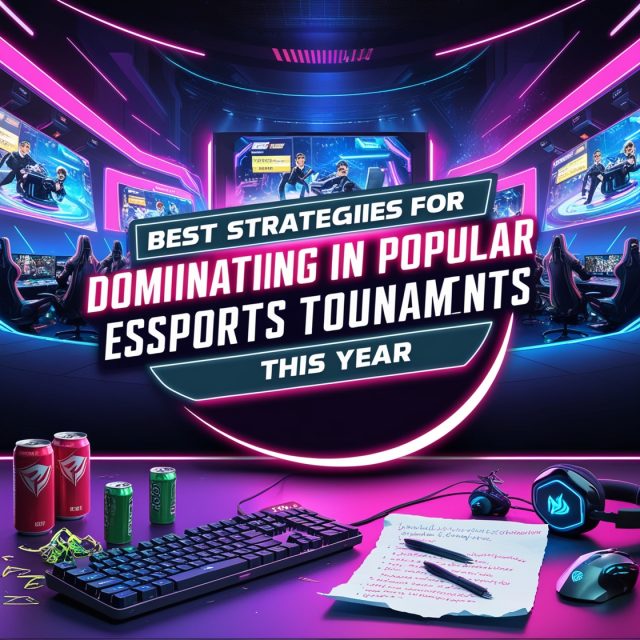The world of esports has exploded in popularity, drawing millions of viewers and offering substantial prize pools for top players. Whether you’re a seasoned pro or a newcomer looking to make your mark, understanding the best strategies for dominating in popular esports tournaments is crucial. From team-based games like “League of Legends” and “Overwatch” to solo titles like “Fortnite” and “Hearthstone,” success in esports requires a combination of skill, strategy, and mental toughness. Here’s a comprehensive guide to help you dominate in esports tournaments this year.
1. Mastering Game Mechanics
To succeed in any esports tournament, the foundation is mastering the game mechanics. Whether it’s last-hitting in “Dota 2,” precision aiming in “Counter-Strike: Global Offensive,” or building structures in “Fortnite,” understanding and perfecting the core mechanics of your chosen game is non-negotiable.
- Practice Regularly: Consistent practice is key to refining your mechanics. Spend time in training modes, play solo games, and review your gameplay to identify areas for improvement.
- Focus on Micro and Macro Skills: In team-based games like “League of Legends,” balancing micro (individual) skills like last-hitting and dodging with macro (team-oriented) skills like map awareness and objective control is crucial. Practice these aspects in tandem to become a well-rounded player.
- Adapt to Meta Shifts: The competitive landscape of esports games often changes with patches and updates. Staying on top of these changes and adapting your playstyle to the current meta (most effective tactics available) is essential for staying competitive.
Conquer the Arena: Master the Best Strategies for Esports Dominance!
2. Developing Game Sense and Awareness
Game sense refers to your understanding of the game’s dynamics, including predicting opponents’ moves, knowing when to engage or retreat, and making informed decisions based on the state of the game. High-level game sense separates top-tier players from the rest.
- Map Awareness: Constantly monitor the minimap, especially in games like “League of Legends” or “Overwatch.” Knowing the positions of your teammates and enemies can help you anticipate ganks, rotations, and ambushes.
- Predicting Enemy Movements: In games like “CS: GO” or “Valorant,” predicting where your opponents will move next can give you a significant advantage. Use audio cues, game knowledge, and patterns to make educated guesses.
- Adaptation: In a competitive setting, your opponents will be skilled at countering your strategies. Developing the ability to adapt on the fly and change your tactics mid-game is crucial. This could involve switching heroes in “Overwatch” or changing your build order in “StarCraft II.”
3. Effective Communication and Team Coordination
In team-based esports, communication is the backbone of success. Poor communication can lead to misplays and missed opportunities, while strong communication can secure victories even in tough situations.
- Clear and Concise Communication: Avoid cluttering voice chat with unnecessary information. Stick to important callouts such as enemy positions, cooldowns, and objective timers. In games like “Rainbow Six Siege,” where every second counts, clear communication can be the difference between winning and losing a round.
- Assign Roles and Responsibilities: Each team member should know their role and responsibilities within the team. In “League of Legends,” for instance, the support player should focus on vision control and peeling for carries, while the jungler should prioritize ganks and objective control.
- Practice Team Play: Regularly scrimming (practicing against other teams) is vital for developing synergy and coordination. Use these sessions to refine strategies, practice communication, and build trust among teammates.
4. Strategic Planning and Preparation
Preparation is key to success in esports tournaments. This includes not only practicing mechanics but also developing and refining strategies that can be executed under pressure.
- Research Your Opponents: Before a match, gather as much information as possible about your opponents. Study their previous games to understand their playstyle, strengths, and weaknesses. This allows you to tailor your strategies accordingly.
- Draft and Composition Strategies: In games with a drafting phase, like “Dota 2” or “League of Legends,” the composition of your team can dictate the flow of the game. Prioritize picking strong champions or heroes that synergize well together and can counter the enemy’s picks.
- Have Backup Plans: Even the best strategies can fall apart if your opponent adapts well. Having contingency plans, such as alternate compositions or strategies, ensures you’re never caught off guard.
5. Mental Resilience and Focus
Esports tournaments can be mentally exhausting, with long hours of competition and high-pressure situations. Maintaining mental resilience and focus is essential for performing at your best.
- Stay Calm Under Pressure: High-pressure situations can lead to mistakes if you’re not careful. Practice staying calm and composed during intense moments, and focus on executing your game plan rather than the stakes.
- Develop a Pre-Game Routine: A consistent pre-game routine can help you get into the right mindset for competition. This could include activities like stretching, deep breathing exercises, or visualizing success.
- Embrace a Growth Mindset: Even the best players lose sometimes. Viewing losses as learning opportunities rather than failures is crucial for long-term improvement. After each match, review your gameplay, identify mistakes, and work on correcting them.
6. Mastering the Meta
Understanding and adapting to the current meta is essential for staying competitive in any esport. The meta refers to the most effective strategies, characters, or items that are prevalent in the current version of the game.
- Keep Up with Patch Notes: Developers regularly release patches that can change the balance of the game. Keeping up with these updates allows you to stay ahead of the curve and adapt your strategies to the new meta.
- Analyze Professional Play: Watching professional tournaments and streams is a great way to understand the current meta. Pay attention to the strategies used by top teams and players, and consider how you can incorporate them into your own play.
- Experiment with New Strategies: While it’s important to understand the meta, don’t be afraid to experiment with new strategies. Innovating can give you an edge over opponents who may be unprepared for unconventional tactics.
7. Physical Health and Well-Being
Esports may be a mental game, but physical health still plays a significant role in your performance. Maintaining a healthy lifestyle can improve focus, reaction time, and overall well-being.
- Prioritize Sleep: Lack of sleep can severely impact your cognitive abilities, including decision-making and reaction time. Ensure you get adequate rest, especially before a tournament.
- Healthy Diet: A balanced diet can provide the energy and nutrients needed for sustained focus and performance. Avoid heavy, greasy foods before playing, as they can lead to sluggishness.
- Exercise Regularly: Regular physical activity can help reduce stress, improve concentration, and boost energy levels. Incorporating exercises that promote hand-eye coordination, such as playing catch or using a reflex ball, can also be beneficial.
Level Up Your Game: Top Strategies for Esports Victory This Year!
8. Building a Support System
Having a strong support system can make a significant difference in your esports career. This includes not only your teammates but also coaches, managers, and even friends and family.
- Work with a Coach: A coach can provide valuable insights, help you develop strategies, and offer guidance on improving your gameplay. Many top esports teams employ coaches to help them stay competitive.
- Team Chemistry: Building good chemistry with your teammates is crucial for success in team-based esports. Spend time bonding outside of practice sessions to strengthen your relationships and improve teamwork.
- Seek Feedback: Don’t hesitate to seek feedback from your teammates, coach, or even other players in the community. Constructive criticism is essential for growth, and having a support system that provides honest feedback can help you identify areas for improvement.
9. Understanding the Tournament Format
Every esports tournament has its own format, which can range from single-elimination brackets to round-robin group stages. Understanding the format of the tournament you’re competing in is essential for developing your strategy.
- Adjust Strategies for the Format: Different formats require different approaches. For example, in a best-of-one format, you might opt for a safer, more consistent strategy, while in a best-of-five, you might take more risks in the early games to gain an advantage.
- Manage Your Energy: Tournaments can be long and grueling, especially those with multiple rounds in a single day. Plan your energy usage, ensuring you don’t burn out early in the competition. Take breaks between matches, stay hydrated, and focus on maintaining your mental and physical stamina.
- Prepare for Potential Matchups: In tournaments with bracket formats, you’ll often have a good idea of who you might face next. Use this information to prepare specific strategies and counter-picks for potential opponents.
10. Leveraging Technology and Tools
In the digital age, numerous tools and technologies can aid your esports training and performance. Leveraging these resources can give you a competitive edge.
- Use Replay Analysis Tools: Analyzing replays of your matches is one of the most effective ways to identify mistakes and improve. Tools like LoL Replays for “League of Legends” or Overwatch’s built-in replay system can help you review your gameplay in detail.
- Performance Tracking Software: Apps and software that track your in-game performance can provide valuable data on your strengths and weaknesses. Use these insights to focus your practice on specific areas that need improvement.
- Voice Communication Tools: Reliable voice communication is crucial for team-based esports. Ensure you’re using a high-quality voice chat service like Discord or TeamSpeak to facilitate clear and effective communication with your teammates.
Conclusion
Dominating in popular esports tournaments requires a blend of technical skill, strategic planning, mental fortitude, and teamwork. By mastering game mechanics, developing game sense, communicating effectively with your team, and staying adaptable, you can significantly improve your chances of success. Additionally, maintaining a healthy lifestyle, building a strong support system, and leveraging technology can further enhance your performance. As the esports landscape continues to evolve, staying informed and continuously improving your skills will be key to achieving victory on the competitive stage. Whether you’re aiming for the top spot or just looking to improve, these strategies will help you navigate the challenging and exciting world of esports tournaments this year.






